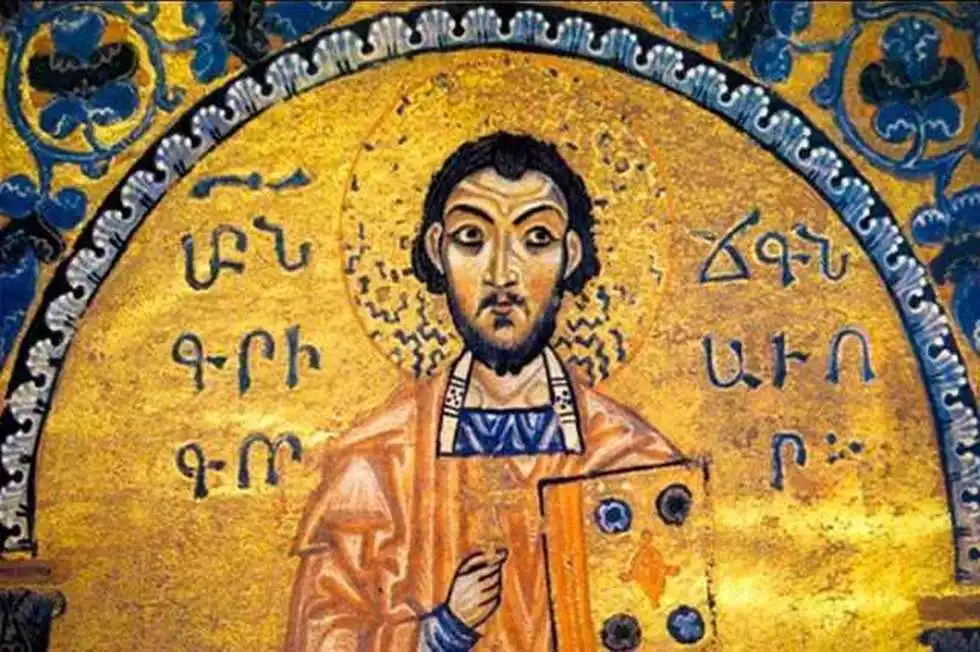
Saint Gregory of Narek, a prominent figure in medieval Armenian literature and theology, was born in 951 AD and passed away in 1003 AD. Esteemed as a mystic, poet, and theologian, Gregory’s profound influence extends beyond the borders of Armenia, earning him a revered place in Christian history. His works, characterized by deep spirituality and poetic elegance, have left an indelible mark on the Christian literary and theological landscape.
Early Life and Monastic Calling
Saint Gregory of Narek’s journey began in the Armenian town of Andzevatsik, where he was born into a family deeply rooted in ecclesiastical tradition. His father, Khosrov Andzevatsi, a learned bishop, played a pivotal role in his early education, instilling in him a profound understanding of Christian doctrine and Armenian culture. This upbringing laid the foundation for Gregory’s lifelong devotion to spiritual and theological pursuits.
The young Gregory was soon drawn to monastic life, a calling that led him to the Monastery of Narek, a center of learning and spirituality in medieval Armenia. Here, Gregory’s intellectual and spiritual capacities flourished. He immersed himself in scriptural studies, Armenian church traditions, and theological discourse, cultivating a deep understanding of Christian mysticism. This period marked a significant phase in his life, where he honed his skills as a theologian and poet, setting the stage for his future works that would resonate across centuries.
Chapter 2: Literary Contributions and Theological Impact
Saint Gregory of Narek’s most significant contribution to Christian literature is his magnum opus, the “Book of Lamentations.” This masterpiece, also known as “Narek,” comprises 95 prayerful reflections, offering profound insights into the human condition and the quest for divine grace. Written in the Armenian language, this work stands as a monumental achievement in medieval literature, blending theological depth with poetic beauty.
Gregory’s literary style is characterized by its introspective nature, exploring themes of repentance, human frailty, and the longing for God’s mercy. His writings reveal a soul deeply attuned to the struggles and aspirations of humanity, seeking solace and redemption through prayerful dialogue with God. This distinctive approach not only cemented his status as a leading theologian of his time but also made his works universally relatable, transcending cultural and temporal boundaries.
Saint Gregory of Narek’s theological contributions were equally significant. His interpretations of biblical texts and exploration of Christian doctrine provided fresh perspectives that enriched the theological discourse of the time. His thoughts on the nature of God, the role of prayer, and the journey towards spiritual union with the divine, have been influential in shaping the contours of Christian mysticism. His legacy, therefore, is not merely confined to Armenian Christianity but extends to the broader Christian tradition, where his insights continue to inspire and enlighten.
Spiritual Teachings and Influence
Saint Gregory of Narek’s teachings, deeply rooted in Christian mysticism, emphasize the transformative power of prayer and repentance. His understanding of human suffering and the path to salvation is profoundly articulated in his writings. Gregory viewed suffering not as a divine punishment but as a means to draw closer to God, encouraging a journey of self-examination and spiritual growth. His teachings significantly influenced Armenian religious thought and practices, shaping the spiritual identity of the Armenian Church.
Chapter 4: Legacy and Canonization
The legacy of Saint Gregory of Narek extends far beyond his lifetime. His works, especially the “Book of Lamentations,” have been a source of inspiration and solace for generations. In recognition of his enduring spiritual and theological contributions, Gregory was canonized as a saint by the Armenian Apostolic Church. Further, in 2015, Pope Francis declared him a Doctor of the Church, a rare honor that underscores his significant impact on Christian thought and spirituality worldwide.
Saint Gregory of Narek, a mystic, theologian, and poet, remains a towering figure in Christian history. His profound insights into the human soul, his poetic expression of faith, and his enduring influence on Christian spirituality mark him as a truly universal figure. His works continue to inspire and guide those on their spiritual journey, transcending time and culture.
Feast Day: February 27
Patron Saint of: Armenian Apostolic Church
References
- Stone, Michael E. “Armenian Christianity: A Global History.” Routledge, 2020.
- Terian, Abraham. “Gregory of Narek.” St. Anselm Institute. (Accessed 21 December 2023).
- Terian, Abraham. St. Gregory of Narek: Mystic and Poet.” Armenian Theological Review, 2005.
- Thomson, Robert W. “Narek.” Archive.org. (Accessed 21 December 2023).
- Word on Fire. “St. Gregory of Narek: The Marginal Doctor.”(Accessed 21 December 2023).
